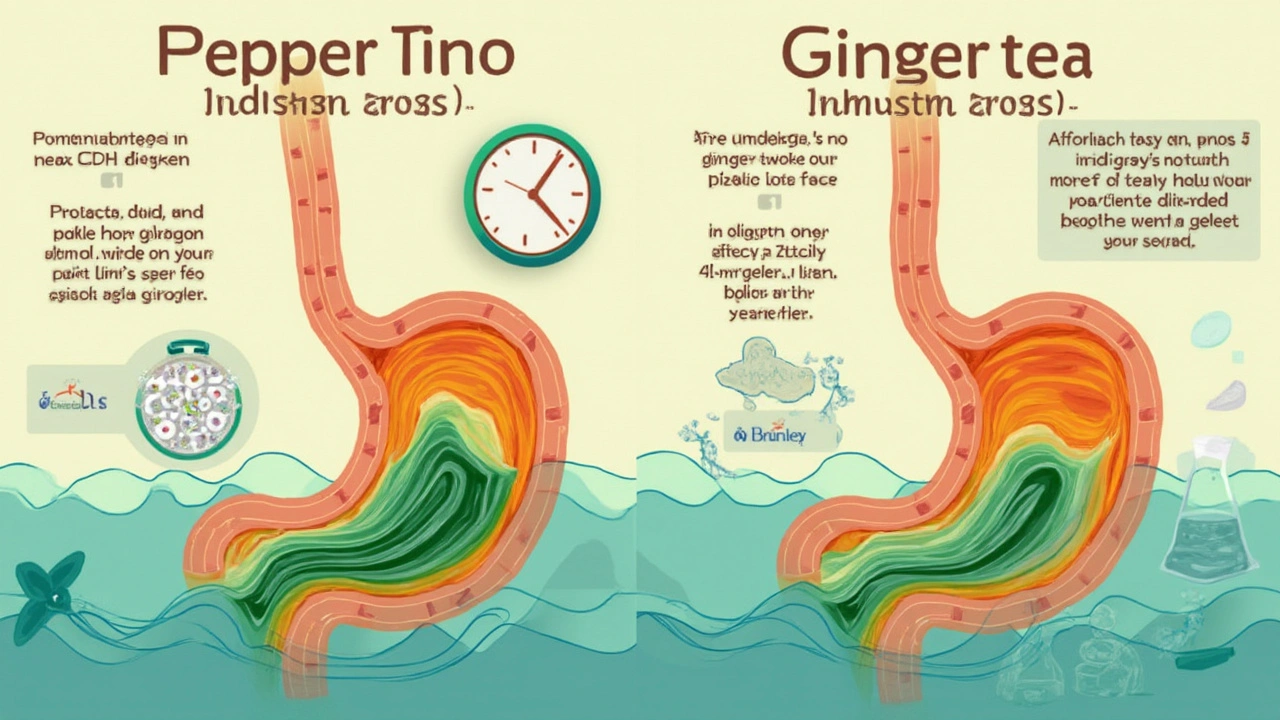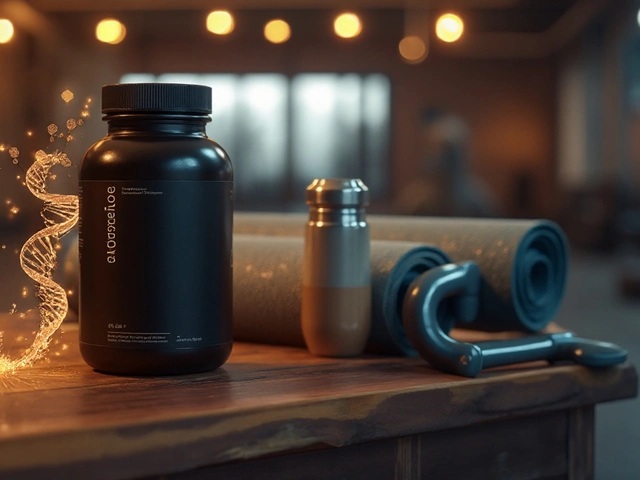
The Science Behind Peppermint and Ginger: Why They Tackle Indigestion
Everyone’s felt that stomach grip—after a big meal, a dodgy lunch, or just bad luck. Two teas always seem to get name-dropped as fixes: peppermint tea and ginger tea. But what’s happening under the hood when you sip these herbs, and why do they help so much? It turns out, both peppermint and ginger bring their own brand of relief, but they don’t work the same way.
Let’s start with peppermint. The fresh, cooling flavor comes from menthol, its star ingredient. When menthol reaches your stomach and intestines, it works like a natural muscle relaxer. Basically, it chills out the smooth muscles lining your gut. This makes it popular for cramping, bloating, and that annoying full feeling after overeating. There’s old-school evidence and newer clinical studies backing this up—doctors sometimes even recommend peppermint oil capsules for folks with irritable bowel syndrome (IBS). One study out of King’s College London in 2019 found that peppermint oil eased uncomfortable IBS symptoms for about two-thirds of people who tried it. That’s not bad for a cup of leaves and hot water.
Ginger works differently. Its magic touch comes from compounds called gingerols and shogaols. Instead of relaxing muscles, ginger tones things up. It prompts the stomach to empty faster, and gets your digestive juices flowing. If you’re feeling heavy, gassy, or queasy—think mild nausea after greasy food—ginger has a knack for settling things down fast. That’s why it’s the classic go-to for travel sickness or pregnancy nausea. A fun stat: a 2018 review study covering more than 30 trials showed ginger helped reduce nausea in 58% of travelers and 74% of pregnant women facing morning sickness. While peppermint relaxes, ginger literally revs up the engine.
But it’s not just about the gut. Both teas tap into your nervous system too. Sipping hot drinks triggers a relaxation response in the brain, calming you overall. Some scientists even say the ritual—boiling the water, steeping the tea—is half the relief. If you feel better before you finish your cup, that’s not just in your head. It’s a mind-gut connection at work.
It’s worth noting: peppermint might not suit everyone. People with acid reflux sometimes find it makes symptoms worse. The same muscle relaxing effect that’s a blessing for IBS can let stomach acid slip upwards, so if you’re prone to heartburn, take care. Ginger is usually gentler on the upper stomach but go overboard, and it may irritate sensitive stomachs or thin your blood if you’re on certain meds.
If you want to really geek out: here’s a quick comparison in stats style:
| Peppermint Tea | Ginger Tea | |
|---|---|---|
| Main Action | Muscle relaxant | Speeds up gastric emptying |
| Key Compound | Menthol | Gingerols, shogaols |
| Best For | Bloating, cramps, IBS | Nausea, gas, slow stomach |
| Possible Side Effect | Heartburn (for some) | Mild stomach upset (rare) |
Now you know the science, let’s get into how these teas actually work in real-life situations—and who wins in a real race for relief.

Peppermint Tea: Cooling Relief or Just Hype?
If you’ve ever been given peppermint tea as the family remedy for an upset stomach, you’re not alone. Daycares, old-school diners, and grandmas everywhere stock it for a reason. Let’s break down if this cool, minty brew is just a pleasant placebo or a true match for indigestion.
Peppermint tea is made from dried peppermint leaves—not to be confused with spearmint, which is milder and less medicinal. Brewed strong, it packs a wallop of menthol, which is the same stuff you’ll spot in chest rubs and muscle creams. In the digestive world, though, menthol’s relaxation effect is front and center. After eating a heavy meal or something that “just didn’t sit right,” that relaxing action on the gut muscles can bring speedy relief for trapped gas and waves of bloating. Remember those king-sized meals that leave your waistband digging in? That’s when peppermint tea really comes through.
Researchers at the University of Exeter took a close look at peppermint’s benefits, reviewing dozens of trials: they found that peppermint oil, and by extension strong peppermint tea, reduced IBS-related pain and improved overall comfort for nearly 40% of sufferers. Now, I’m not saying this is a replacement for medical advice, but the numbers aren’t nothing. People without IBS dish out plenty of anecdotal high-fives too—one cup after pizza, and things start to mellow out in under 20 minutes for many folks.
But is peppermint tea always safe? Here’s the catch. Peppermint is famous for relaxing the lower esophageal sphincter—the muscle





Damon Stangherlin
May 5, 2025 AT 16:55Also, ginger tea for morning nausea? Absolute lifesaver. I used to gag just smelling breakfast, now I’m sipping ginger like it’s coffee. Game changer.
Ryan C
May 6, 2025 AT 20:43Dan Rua
May 8, 2025 AT 16:58Mqondisi Gumede
May 9, 2025 AT 13:36Douglas Fisher
May 11, 2025 AT 01:58Albert Guasch
May 11, 2025 AT 08:40Ginger Henderson
May 12, 2025 AT 08:02Bethany Buckley
May 12, 2025 AT 21:01Stephanie Deschenes
May 13, 2025 AT 20:58Cynthia Boen
May 15, 2025 AT 20:01Amanda Meyer
May 16, 2025 AT 14:47Jesús Vásquez pino
May 17, 2025 AT 04:56hannah mitchell
May 17, 2025 AT 13:17vikas kumar
May 18, 2025 AT 00:42Vanessa Carpenter
May 18, 2025 AT 11:14Bea Rose
May 19, 2025 AT 14:24Michael Collier
May 19, 2025 AT 17:16Shannon Amos
May 21, 2025 AT 00:33stephen riyo
May 21, 2025 AT 11:22Wendy Edwards
May 23, 2025 AT 03:18Damon Stangherlin
May 23, 2025 AT 17:05